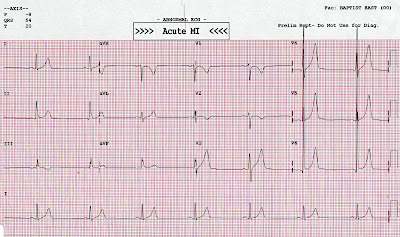(For those seeking in-depth detail and a comprehensive bibliography of sources, this month’s Heart Rhythm Journal featured a number of enlightening papers on this controversial topic.)
Although in the past I have written about the folly of the inguinal hernia exam as part of a sport’s physical; the heart of the matter–detecting a life-threatening cardiac pathology–is quite serious.
I had prepared a lengthy ‘bullet-point’ list as to why the seemingly no-lose proposition of adding an ECG to the routine history and physical exam would not work in the real-world of American healthcare.
But I found a better way to illustrate said quandary. With pictures, of course.
If widespread screening were instituted, here is a prototypical ECG:
Here is the same ECG before I photoshopped out the computer interpretation:
 |
| Note the “ACUTE MI” designation. |
This bike racer was not having chest pain. Nor does his asymptomatic resting heart rate of 43 require a pacemaker.
Just for grins, I showed this nameless ECG around. Most eyes were immediately drawn to the provocative but incorrect computer diagnosis. (Imagine if the same ECG was done in an emergency room for a case of musculo-skeletal non-cardiac chest pain.)
These days, in our present healthcare climate, making a diagnosis of ‘normal’ is increasingly difficult. In cardiology matters, saying to a patient, “you are normal…no further testing is required” often entails a hefty dose of radiation or ultrasound waves. That is, unless the doctor has sound judgment, and guts.
Multiply this ECG scenario by millions of young athletes screened.
Ouch.
JMM

2 replies on “The feasibility of routine ECG screening of athletes?”
Thank goodness SOMEONE recognizes athletes' bodies may be different. Although it is comforting to have a normal or a standard to compare a sample to, maybe research could involve establishing a few variations of the already accepted norm. My favorites being: the active person's norms versus the sedentary person's norms. 🙂
Enjoyed reading this post.
I'm asked week-in and week-out about screening exams and tests for adult athletes.
What do YOU recommend for the seemingly healthy 25-45 year old male non-elite athlete who asks about screening? Annual physical? Any lab tests? ECG? Echo?
It obviously takes you just a moment to conclude that the "abnormal" ECG above is okay for an athlete, but I do realize that your expertise is not available to the millions of athletes out there in any efficient manner.
I think this is a difficult issue.